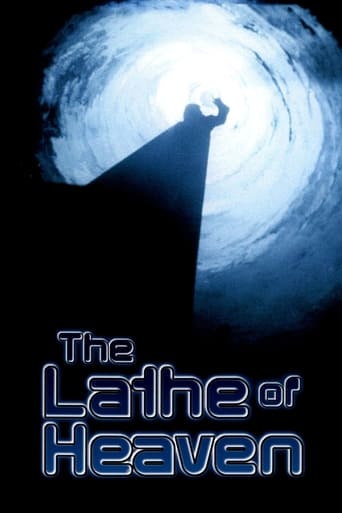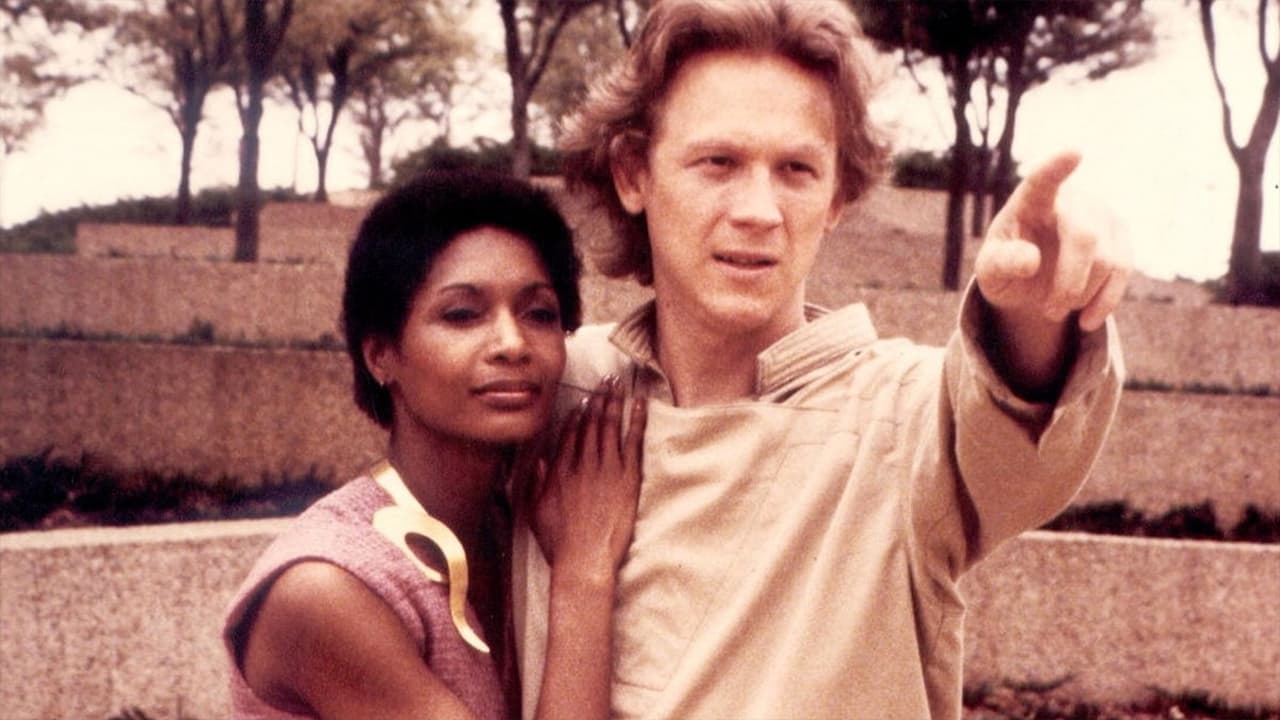alpe97
This original version remains my favorite film of all time. Somehow it's much better than even its color remake. A very close tie is Forbidden Planet. Close behind are the classic BLADE RUNNER and the color version of Lathe of Heaven. The greatest series EVER for TV is, of course, Babylon 5 followed by the original PRISONER.The stark scenes, in the 1980 LATHE, contrast vividly with the dreamer's rich ability to brighten his, OUR, world. While exploring the power of our minds, it also shows the penalty for careless use and abuse of that power. This is a film to keep and show our kids and theirs and theirs......
Hitchcoc
As a one time science fiction nut, I always found Ursula K. LeGuin to be one of the most challenging writers in her genre. For me, she hung over the mainstream. This is a nice film that doesn't touch the book, but it has fine performances and a reasonable plot within the constraints that are time travel. A psychiatrist takes advantage of a man whose dreams come to realization, trying to manipulate him for his own purposes. He never grasps the idea that dreams are often surreal and uncontrollable. After Forbidden Planet, I know that allowing the baser things to come to the fore can be disastrous. The problem with the whole topic always gets back to the immutability of time. Traveling forward doesn't seem to have issues; back creates, of course, the butterfly effect and makes for unpredictability. This goes to the mat and is reasonably satisfying, though it is full of holes that could easily render it incomprehensible.
MartinHafer
This film was the first film contracted by PBS and it really shows, as the movie had a minuscule budget. If you adjust for inflation, the film literally cost about as much as an Ed Wood, Jr. film to make! At times this shows, such as some liberal use of stock footage, minimalistic sets and negligible special effects---yet, oddly enough, the film is a pretty good sci-fi film. And when I say SCI-FI, I mean very deep and cerebral sci-fi. If you are looking for Darth Vader and cute little androids, this film is not for you--instead, it's set in the very near future and concerns a simple man with an incredible talent. Bruce Davison dreams and what occurs in the dreams actually become reality--as if everything we know to exist is totally dependent on his thoughts. If he dreams, for example, that you no longer exist, then you never really did! Because of his unique problem, Bruce consults with a scientist adept at working on dreams. However, each time this scientist tries to use the dreams to effect positive world change, the dream somehow backfires. A good example--when he wanted his patient to end overpopulation, a plague broke out and wiped out most of the inhabitants! Again and again, these attempts only make things worse.The film is an interesting blend of philosophy, existentialism and sci-fi. While it won't appeal to everyone, I at least appreciated how unique it was and how those involved tried to make something different. A noble effort that sometimes succeeds and often time fails--mostly due to a low budget. I wonder what this MIGHT have been like with a bit more money to make the aliens and some of the other plot devices not to incredibly cheesy.
FloatingOpera7
Lathe Of Heaven..Starring Bruce Davison, Kevin Conway, Peyton Park, Niki Flacks, Vandi Clark, Bernadette Whitehead, Jo Livingston, Jane Roberts, Tom Watts...Director Fred Barzyk...1980 When, in 1980, award-winning sci-fi author Ursula K. Leguin's novel was released as a film, it was the first film broadcast on PBS, the greatest TV channel ever made. As a film, it is stunning, symbolic, allegorical, frightening in its intensity and beautiful in it theme of transience and eternal struggles of good and evil. George Orr, played Bruce Davison who talks and looks somewhat like Mark Hamill (Luke Skywalker), is a neurotic young man who undertakes involuntary therapy in the future, a world that has survived a great global destruction. His therapist (Kevin Conway) hypnotizes him and uses a machine to tap into his mind as he discovers that his dreams affect present reality. We discover also, that it has been his dreams that has altered human history since the Stone Age all the way to the Armaggedon, nuclear Holocaust that destroyed the world "before April." The therapist, although well-meaning in his quest to vanquish racism, disease, world hunger and all the major problems in the world, only ends up destroying more than he creates. The therapist/doctor has been labeled as the film's villain, which is not what Leguin herself intended. The therapist is good, as all people are innately good. We remember the line when he tells George Orr, "we are going to make the world right." But the elemental forces of nature cannot be controlled by neither God or man, and regardless of our noble intentions, there are dark consequences every time we try do to something to better ourselves. Life, all life, in the past, now and in the future, can only be composed of creative and destructive forces, good and evil, in a yin-yang balance that is eternal and necessary for existence. The interpretation I made the first time I viewed the film was this, although you may interpret any which way you'd like - the individual (George Orr), each of us, man or woman, is an instrument or sum of nature and we are as if part of a bigger dream or series of dreams that is our lifetime, the dreams ending completely when we die. In order to be truly happy, we must always do good, we must be ourselves and not sacrifice neither or individuality nor compassion and humanity- something the doctor seems to have done in a drunken pursuit of power. As for meaning in our life, yes, there is meaning, when we find a religion, belief, career, marriage, love, ANY relationship, and friendship and the meaning of every collective person makes up a beautiful dream, and the dream is over when we die. It was very obvious that the therapist doctor was a parody of religion, or God himself (He tells Orr when he abandons his clinic "You will be back! Without me there is no hope"something no person can do alone in his or her lifetime, and the patient is people altogether. The therapist/patient relationships becomes God/man relationship and the entire meaning of life. This is more profound than even the message in 2001: A Space Odyssey. This voyage into inner space, outer space and everywhere at once, is the most fascinating film ever made about science fiction and the mystery of the universe. I recommend everyone to see this film I urge teachers to read this book to college or high school level students. It's about nothing. It's about everything. It's about what is, what is not and what is to be. Like one of George Orr's dreams.


 AD
AD



